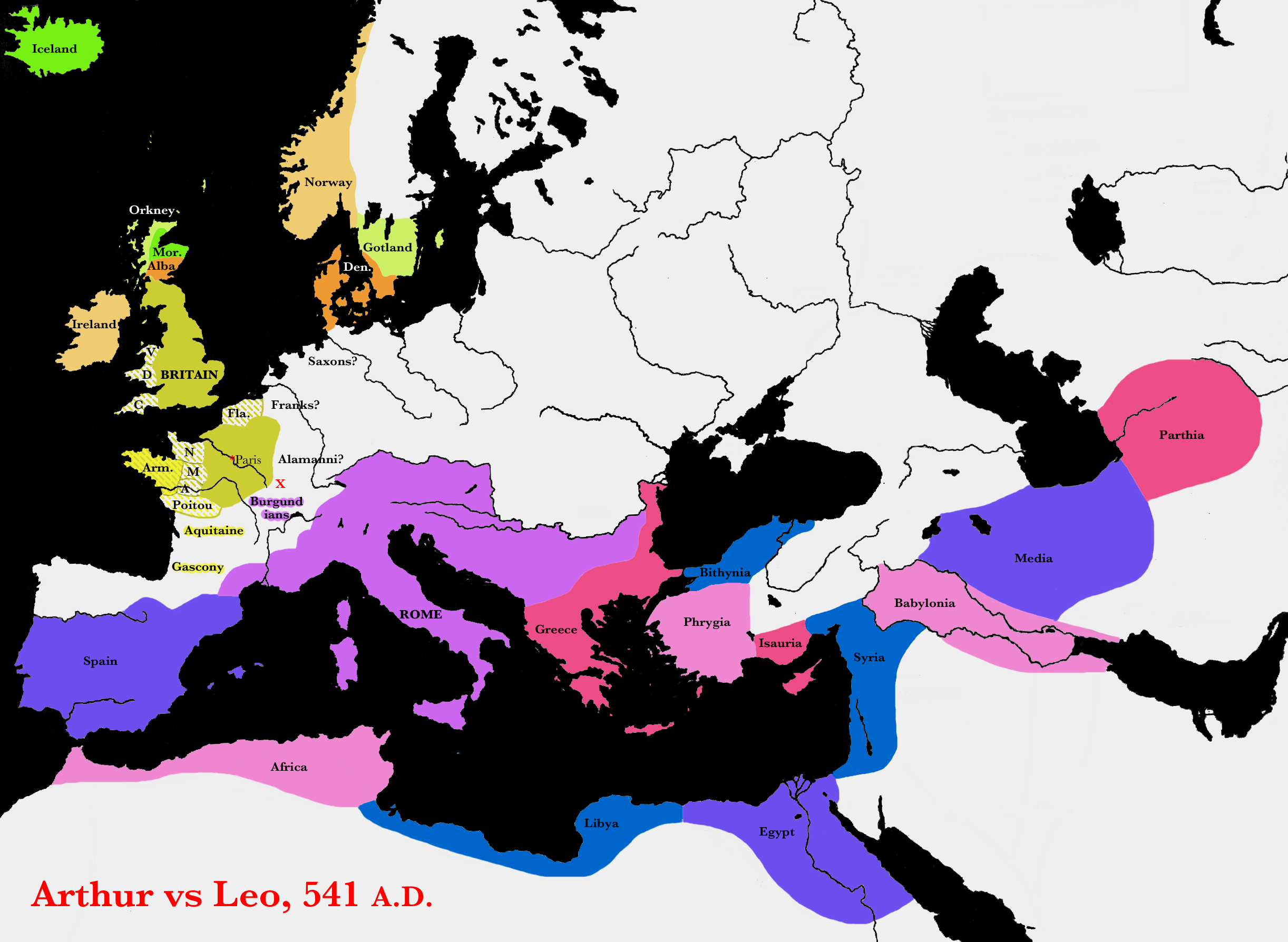Alternate/Pseudo-History Map of Arthur vs Leo in 541
Last modified: 2018-11-12
This map is really more pseudohistory than alternate history --- it is based upon the "History of the Kings of Britain'' (c.1137) by Geoffrey of Monmouth. It was this infamous pseudohistory that made King Arthur famous throughout Christendom. Geoffrey gave Arthur an Empire in north-west Europe, and naturally pitted him against the greatest Empire that ever was (up to that time), the Roman Empire under Emperor Leo, in 541 A.D. This map shows the two Empires as they could be reconstructed from Geoffrey's text, using the real locations and extents of various political entities he names, with some imaginative reconstruction to make the boundaries of the Empires more plausible.
The two Empires are shown with different colour themes: golden for Arthur, and purple for Leo. Within these there are kingdoms, with different shades, subject to Britain and Rome respectively. Here 'Mor.' is short for Moray and 'Den.' for Denmark. For Arthur's kingdom there are also duchies (sometimes represented by Geoffrey as sub-kingdoms) indicated by hatching in Arthur's colour. These are: Venedotia ('V'), Demetia ('D'), Cornwall ('C'), Flanders ('Fla.'), Normandy ('N'), Maine ('M'), and Anjou ('A').
Armorica ('Arm.') is an unusual case. It is sometimes represented as a kingdom equal to Britain, with Hoel coming to Arthur's rescue, and sometimes as a dukedom within Arthur's kingdom. Poitou was conquered by Hoel, and is not named even as a duchy, so I've attached it to Armorica by hatching. Geoffrey claims that Arthur and Hoel conquered all Gaul, but most regions of Gaul do not have contingents appearing in Arthur's army, and the battleground of Arthur and Leo at Saussy (the red cross) is not stated as having been in Arthur's Empire. So I have limited Arthur's and Hoel's Empire to north-western and central Gaul. However I have used Hoel's colour to shadow the names of Aquitaine and Gascony, as he is said to have conquered those places. I have also used the Emperor's colour to shadow the name of Burgundy, since the Romans must have advanced through there to confront Arthur.
I have used modern names equivalent to those which Geoffrey uses, which for the most part are uncontroversial. The most problematic is a "king of the Ituri", who seem to be an obscure Old Testament tribe in the holy land. To make geographical sense, I have instead included in Leo's Empire a kingdom of the Isauri (Isauria), which fills a gap and doesn't conflict with Geoffrey's also having a kingdom of Syria. On the basis of the map, I wouldn't have given much for Arthur's chances, and yet he comes out on top of course. One gets the feeling that Geoffrey, from a north-western European perspective, really didn't understand the scale of the countries he was describing as part of Leo's Empire, which dwarfs Arthur's Empire.
Although this historical situation never occurred in our world, it is diverting to think about what might have allowed it to happen. The most plausible scenario I can think of is history diverting from our timeline in the first century B.C., with a smashing Roman victory over the Parthians, who are driven back to their homelands. Then, emulating Alexander, the Empire might have extended east, conquering Babylonia, Media, and Parthia. If the Empire became bogged down in holding those areas it may never have established firm rule over Gaul and Britain (or the interior of Asia Minor), being a much more Mediterranean- and Eastern-focussed Empire. And perhaps the Empire may have emerged from the crisis of the third century (or something analogous) with a much looser political structure, still centred on Rome, but with a dozen or so kingdoms owing allegiance and tribute but otherwise autonomous. In this milieu, it is conceivable that north-western Europe, occasionally ruled by Rome but never entirely subdued, could have developed larger states much earlier than in our timeline, and also accelerated Viking settlement, from northern Scotland to Iceland. But really it is pretty hard to believe Geoffrey's clash of Empires even as alternate history.
Return to Howard Wiseman's History page

